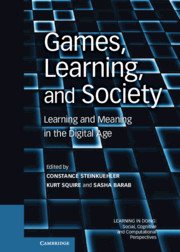Book contents
- Frontmatter
- Contents
- Contributors
- Series Foreword
- Foreword
- Acknowledgments
- Section I Games as Designed Experience
- Section II Games as Emergent Culture
- Section III Games as Twenty-First-Century Curriculum
- 17 Introduction to Section III
- 18 Prediction and Explanation as Design Mechanics in Conceptually Integrated Digital Games to Help Players Articulate the Tacit Understandings They Build through Game Play
- 19 Game-Based Curricula, Personal Engagement, and the Modern Prometheus Design Project
- 20 Discovering Familiar Places
- 21 Developing Gaming Fluencies with Scratch
- 22 “Freakin’ Hard”
- 23 Models of Situated Action
- Afterword Games and the Future of Education Research
- Index
- References
17 - Introduction to Section III
Published online by Cambridge University Press: 05 August 2012
- Frontmatter
- Contents
- Contributors
- Series Foreword
- Foreword
- Acknowledgments
- Section I Games as Designed Experience
- Section II Games as Emergent Culture
- Section III Games as Twenty-First-Century Curriculum
- 17 Introduction to Section III
- 18 Prediction and Explanation as Design Mechanics in Conceptually Integrated Digital Games to Help Players Articulate the Tacit Understandings They Build through Game Play
- 19 Game-Based Curricula, Personal Engagement, and the Modern Prometheus Design Project
- 20 Discovering Familiar Places
- 21 Developing Gaming Fluencies with Scratch
- 22 “Freakin’ Hard”
- 23 Models of Situated Action
- Afterword Games and the Future of Education Research
- Index
- References
Summary
Over the last decade we have seen video games grow in popularity, becoming one of the most influential forms of entertainment in the last century. According to the Entertainment Software Association (2009), at least 68 percent of American households play computer and video games, and the number of years that adults have played video games averages 12 years. Other surveys also have demonstrated that video gaming as a leisurely pursuit is pervasive: 97 percent of youth play video games and 53 percent of adults also play video games (Lenhart, Jones, & Macgill, 2008; Lenhart et al., 2008). Clearly, video games are engaging to diverse populations, and for this reason alone, many educators are interested in leveraging technologies and methodologies to support learning. However, games are more than fun, and Gee (2003/2007) argues that it is their potential to support meaningful learning that makes them truly of interest to educators. There are many reasons that educators should care about video games, including their noted discursive richness, depth of collaborative inquiry, complexity of game play, opportunities for consequentiality, rich perception-action cycles, exploration of situated identities, and the complex forms of learning and participation that can occur during game play (Gee, 2003/2007; Salen & Zimmerman, 2004; Shaffer et al., 2005; Squire, 2006; Steinkuehler 2006; Shaffer, 2007; Thomas & Brown, 2006).
- Type
- Chapter
- Information
- Games, Learning, and SocietyLearning and Meaning in the Digital Age, pp. 271 - 278Publisher: Cambridge University PressPrint publication year: 2012
References
- 1
- Cited by



